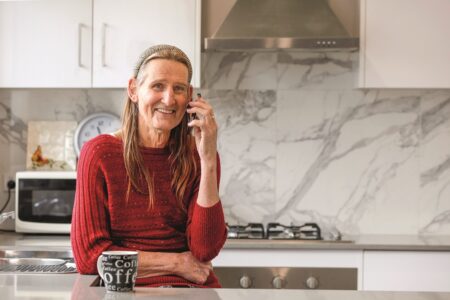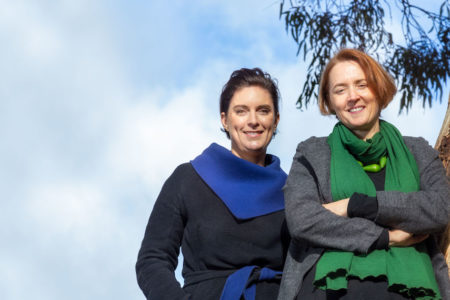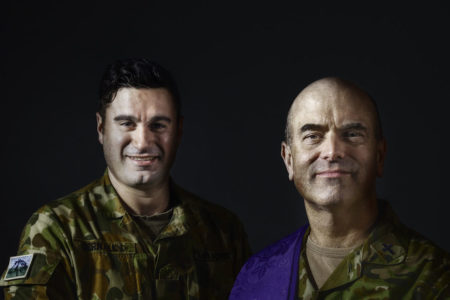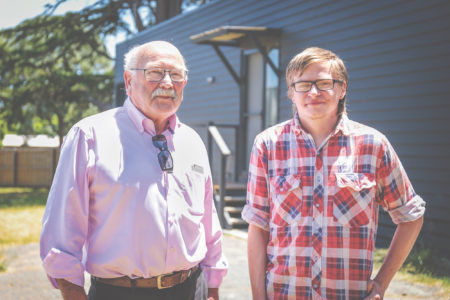Interviews by David Southwell
Frank Johnston
We’ve just been volunteering on a property at Gravesend, NSW, with Outback Links, which is a branch of UCA Frontier Services. This year, Gravesend was really something to behold, a 1700-acre farm with not a blade of grass on it except what they were watering around the house.
It’s really quite heartbreaking to watch what they’re going through. Their cattle herd must be well under half of what they normally carry and they’re having to feed every day to keep the animals alive. They’re prepared to put all of their savings and more into keeping their breeding stock. We met a lot of their friends from the community and they are all in the same boat.
We took our caravan and worked on the property for 10 days. We love being on the land, we take to it like ducks to water. I painted some of the outside of the house and fixed up doors and windows inside. I’m more of a handyman than the fellow of the farm.
We’ve done six Outback Links volunteering stints and two with BlazeAid. BlazeAid cleans up and rebuilds fences after fires or floods.
In our local community, we are also both very active with volunteering. Every week, I help with an aged care program called Carramar that was started by our church 35 years ago. Now it’s run by Doncare. I organise transport for the 15 or 16 clients. We take them to a church, have morning tea and then do some activities, such as crosswords, crafts or games. Then, after lunch, we bring in people to inform and entertain.
At 86, I’m the same age as some of the clients, but they have had a different life. Wendy and I have both been lucky that we’ve been fit and healthy, whereas other people our age just aren’t.
I grew up on one of the very first hobby farms in Doncaster East. My grandfather was a farmer and my father was an agricultural scientist. When I was 10, he bought nine acres of old orchid and we moved there. At that time there was no urban development.
I studied surveying at Melbourne University because I thought it was a good balance between outdoors and indoors. I graduated at the end of 1955, then moved to Cooma to work with the Snowy Mountains Hydroelectric Authority. I worked with a lot of the new migrants. In those days I could understand the most atrocious English sometimes, although sometimes it was a bit too hard. It was a totally different world in Australia at that time.
Wendy moved to Cooma from Parkes, NSW, in the same week I arrived there. We met at the Methodist Church in Cooma. Wendy and I married in 1960. In 1966, we moved to Young, NSW, where I spent five years working in cadastral surveying and on contract work with the Division of National Mapping, for which I travelled all over Australia. After that I took up a post as a lecturer at RMIT for 23 years. After my “retirement” I have continued working with RMIT part-time looking after the surveying equipment.
They’ve just given me the flick. Actually, I told them I am finishing at the end of year.
I grew up in a Methodist family. My father’s family was Church of Christ, but my mother’s family was Methodist. We could walk to the Methodist church, but the Church of Christ was another 3km up the road and, well, we weren’t going to walk there.
I’ve been a member of Manningham Uniting Church since 1944 – I’m probably the longest surviving member of the church continuously attending.
I started at East Doncaster Methodist, then Wesley Uniting, then Doncaster East Uniting then Manningham Uniting. I’ve seen it through all the phases. I’ve been active in the church my whole life. I was a leader in the Methodist church and been an elder in the Uniting Church. I’ve been the secretary, treasurer and president of the local Inter-church council for probably 20 years.
My volunteering work picked up after I retired from full-time work. Presently I’m also involved with an ecumenical charity, Love in the name of Christ (LinC). There’s about seven or eight local churches in Manningham who participate.
Largely, it provides transport for people who are living alone to help them get to appointments, mainly medical. We also run a food pantry so we make hampers available for about 15 families. I’ve been organising the distribution of those hampers for the people who can’t come in. This morning I delivered five hampers. Every two weeks that job is on.
After retirement, I never thought ‘I can start taking it easy now’. It worries me actually because I think if I did get sick or injured and couldn’t do anything, I’d get depressed.
Feeling that I’m being useful is just part of my being. But then I think, ‘well I’ve been to a few funerals recently’. I worked out the average age of those people and it came out as 89, so I’ve still got a few more years.
By volunteering, I see that I am helping people get on with their lives in spite of the ill-health, injustices and the bad luck that people have.
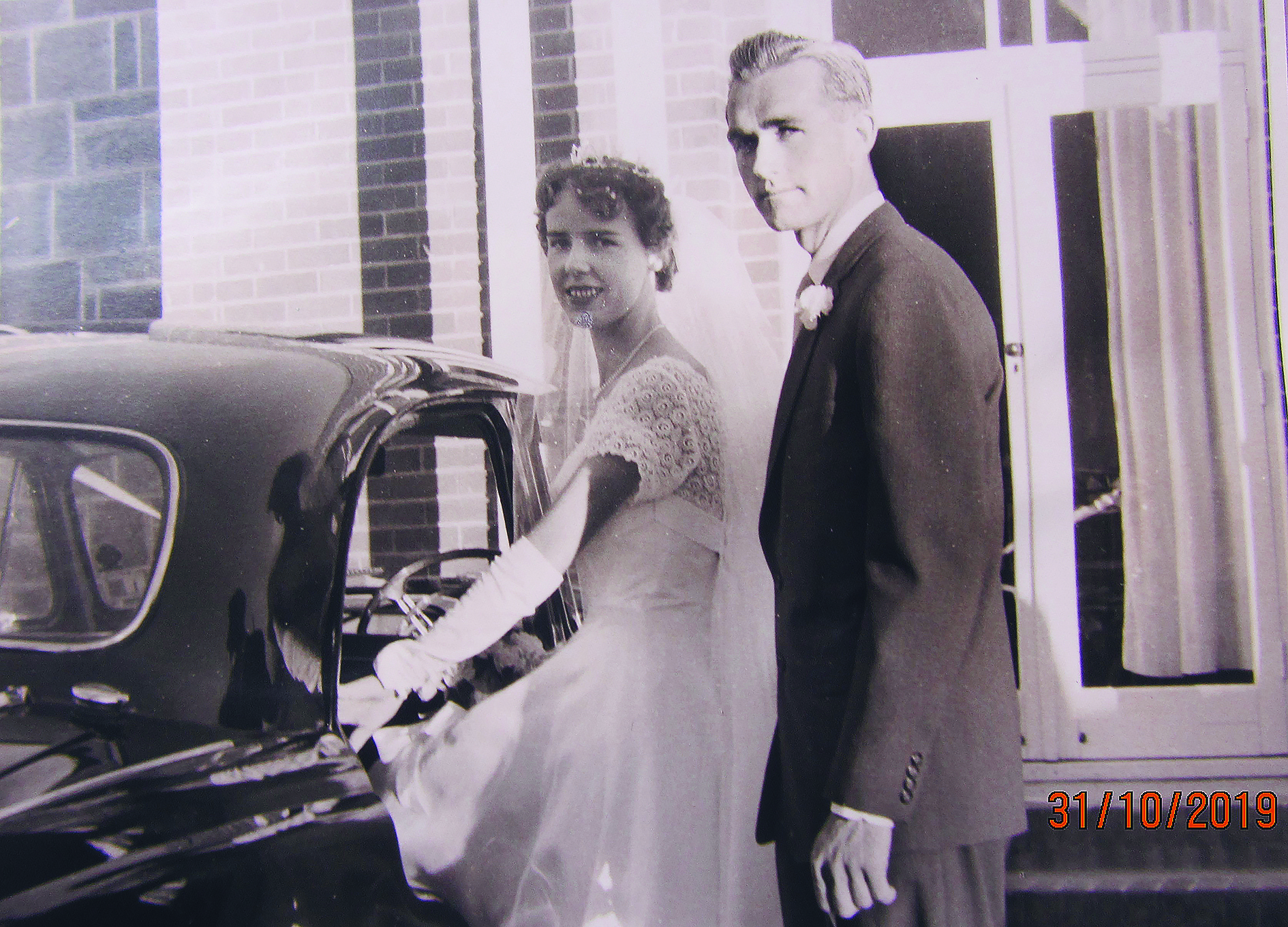 Wendy Johnston
Wendy Johnston
Volunteering on the farm suits me because I am very familiar with rural life. I was born in Tamworth, NSW, and my father was a school teacher. Shortly after I was born, he took up a position at a one-teacher school in Sutton, which was once a tiny village, but now is almost part of Canberra. This was during the war years so we had ration books for all sorts of things.
Every second Sunday we would travel about 13 miles to go to church at Wattle Park, and the other week we would go into Canberra to do shopping. The highlight of that trip was that we would have a picnic down by the river and eat baked rabbit and fresh bread.
In 1950, Dad was promoted to Deputy Principal of Parkes Boys Primary School. This was a big change for us because of the number of kids in our class. But we did have electric lights, a hot water system that ran through the fuel stove AND a flush toilet. What luxuries!
We went to the Parkes Methodist Church twice on Sundays and to Sunday school in the afternoon. I can remember sitting for Sunday school exams in a very formal room. Sunday school anniversaries were very special, sitting in tiered seats with three services in the day, and a new dress. However, I wasn’t very fond of regular school and went to work in the Commonwealth Bank.
We moved to Cooma in 1956 and Dad was principal of the Cooma North Primary School. Cooma North was a suburb built by the Snowy Mountains Authority to house head office staff and it was there that my eyes were opened to other cultures and different languages. My sister and I had great fun mixing with different nationalities at church, YHA and ecumenical fellowship.
I met at Frank at church – we had both arrived in Cooma about the same time. We married four years later and moved to Young. By then I already had two young children and we discovered we were having twins. The folks from church were a wonderful support, they brought us all sorts of extra things that you need for two babies.
Frank’s job as a surveyor meant he was away from home a lot. This was hard for me, with four young children and no family support, but I think it made me very independent.
We will have been married for 60 years in April next year. Naturally, you can have your differences, but I think the fact that we have lots of interests in common, but also have our own interests, has helped us live the journey together. Our four children, Andrea, Carolyn and twins Richard and Jill have presented us with 11 beautiful grandchildren.
Our volunteering started when we moved to Melbourne. I spent five years working in the high-rise flats in North Melbourne with mothers who were not coping with their children, and this resulted in us becoming emergency foster parents. I would bring a child home with me, then have to go to the op shop to get some clothes. We had some delightful children, who responded to care and love.
When Carramar started I was involved in driving and working in the kitchen, but now just provide morning tea on a roster basis. I’m also involved with LinC and that involves a lot of driving, helping young mums and a variety of other jobs. I spent some years with a young mum who had two sets of twins in 11 months, so I would go one day a week to help her, and that was a job I loved. We often get LinC jobs that need regular help, as in weekly or fortnightly.
The involvement with Outback Links has been very rewarding for us. It is amazing what you can turn your hand to if you give it a try. On one property we were relocating a chook house and when the chooks came into their usual place they were so confused. It was so funny watching them wander in a daze and showing them their new home.
Another time we were feeding some young pigs one morning and they got so excited when they saw the food coming that they jumped the fence and we had an exhausting chase to get them all back in – and then we discovered we’d mixed up the boys and girls and had to sort that out.
The Gravesend farm we were on has had about 23mm of rain since we left, but they need follow up. A lot of people think “oh it’s rained they’ll be right now”, but it’s not the case.
Even if it does rain more, it will take some time for the grass to grow back properly and years for the debts to be paid. Even with the last amount of rain they had some run-off into the dam and had to pull some cattle out because they got stuck in the mud. It’s always a drama.
We got a message just the other day from Ruth, the owner of the property we were on, with a picture of their garden’s first sunflower. I planted the seeds.


